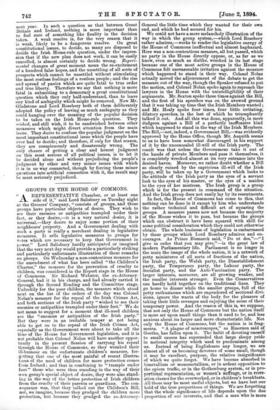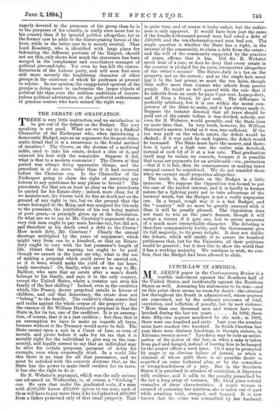GROUPS IN THE HOUSE OF COMMONS. "A REPRESENTATIVE Chamber, or
at least one side of it," said Lord Salisbury on Tuesday night at the Grocers' Company, "consists of groups and these groups have particular objects of desire. They wish to see their enemies or antipathies trampled under their feet, or they desire,—it is a very natural desire it is universal,—they desire to enjoy some portion of their neighbours' property. And a Government dealing with such a party is really a merchant dealing in legislative measures. It sells legislative measures to groups for votes which are necessary to keep that Government in power." Lord Salisbury hardly anticipated or imagined that the very next day would provide a particularly striking and particularly unfortunate illustration of these remarks on groups. On Wednesday a non-contentious measure for the amendment of what has been called "the Children's Charter," the measure for the prevention of cruelty to children, was considered in the Report stage in the House of Commons. 'Sir Richard Webster, the ex-Attorney- General, had it in his charge, and had already carried it through the Second Reading and the Committee stage. Unluckily for the poor children, the measure which stood next on the list of the orders of the day was Colonel Nolan's measure for the repeal of the Irish Crimes Act, and both sections of the Irish party "wished to see their enemies or antipathies trampled under their feet." We do not mean to suggest for a moment that ill-used children are the ",enemies or antipathies of the Irish party." But they were in an irritable temper at not being able to get on to the repeal of the Irish Crimes Act, especially as the Government were about to take all the time of the House for Government legislation, and it is not probable that Colonel Nolan will have another oppor- tunity in the present Session of carrying his repeal through the House of Commons, so they wreaked their ill-humour on the unfortunate children's measure, for- getting that one of the most painful of recent illustra- tons of the need of children for more protection comes from Ireland ; and that in combining to "trample under foot" those who were thus standing in the way of their own group's special object of desire, they were also stand- ing in the way of the better protection of Irish children from the cruelty of their parents or guardians. The con- sequence was, that they talked out the Children's Bill, not, we imagine, because they grudged the children more protection, but because they grudged the ex-Attorney- General the little time which they wanted for their own end, and which he had secured for his.
We could not have a more melancholy illustration of the way in which the group system,—which Lord Rosebery rather admires,— works to render the legislative energy of the House of Commons ineffectual and almost haphazard. Here was a non-contentious measure, all but passed, which no party in the House directly oppose, or, as far as we know, even so much as dislike, wrecked in its last stage because one of the most active groups in the House of Commons felt unreasonable irritation against the measure which happened to stand in their way. Colonel Nolan actually moved the adjournment of the debate to get the measure out of the way, though the Speaker refused to put the motion, and Colonel Nolan spoke again to reproach the lawyers in the House with the unintelligibility of their arguments. Mr. Sexton spoke three times against the Bill, and the first of his speeches was on the avowed ground that it was taking up time that the Irish Members wanted ; and Mr. Healy spoke four times, four little irritating, dilatory speeches, in the last of which he triumphantly talked it out. And all this was done, apparently, in mere dudgeon against a Bill of a perfectly inoffensive kind which happened to stand in the way of the Irish Members. The Bill,—not, indeed, a Government Bill,—was evidently approved by the Home Office, though Mr. Asquith seems to us to have been somewhat discouraged in his support of it by the unconcealed ill-will of the Irish party. The result was that unless the Government take it out of the hands of private Members and pass it themselves, it is completely wrecked almost at its very entrance into the desired haven. Moreover, we rather doubt whether a Bill so clearly ruined by the capricious ill-will of the Irish party, will be taken up by a Government which looks to the attitude of the Irish party as the eyes of a servant look to the eyes of his master, or the eyes of a maiden to the eyes of her mistress. The Irish group is a group which is for the present in command of the situation. And the Irish group does not easily lay by its resentments.
In fact, the House of Commons has come to this, that nothing can be done in it except by him who understands the rather technical and difficult art of squaring the groups. A measure passes now not because the majority of the House wishes it to pass, but because the groups which can obstruct it have been squared with skill for some political consideration which they could, not otherwise obtain. The whole business of legislation is embarrassed by these groups which Lord Rosebery admires and en- courages. As Prince Bismarck said, "Do ut des,"—" I give in order that you may give,"—is the great law of modern Parliamentary life. Parliament is no longer in the main the image of the whole nation, it is a network of petty miniatures of all sorts of fractions of the nation, the Irish party, the Welsh party, the Disestablishment party, the Temperance party, the Labour party, the Socialist party, and the Anti-Vaccination party. The larger interests, moreover, are all growing weaker, and the smaller interests stronger. Even the Conservatives can hardly hold together on the traditional lines. They go home to dinner while the smaller groups, full of the petty enthusiasms which are engendered of sectional divi- sions, ignore the wants of the body for the pleasure of taking their little revenges and enjoying the sense of their temporary power. And the reason of this is, we suppose, that not only the House of Commons but the nation itself is more set upon small things than it used to be and less anxious about its larger and more characteristic life. Not only the House of Commons, but the nation is in frag- ments. "A plague of miscroscopes," as Emerson said of Goethe, has fallen upon it. The habit of devoting oneself to small causes has superseded that large sleepy pride in national integrity which used to predominate among us. Instead of being Englishmen any longer, we are almost all of us becoming devotees of some small, though it may be excellent, purpose, the relative insignificance of which we quite forget. We have become absorbed in bimetallism or monometallism, or in ardent opposition to the opium traffic, or in the Gothenburg system, or in pro- portional representation, or women's suffrage, or in recre- ation classes for the overworked, or in children's breakfasts. All these may be most useful objects, but we have lost our hold of the true proportions of things. We are forgetting that the whole significance of life depends upon the due proportion of our interests, and that a man who is more eagerly devoted to the purposes of his group than he is to the purposes of his country, is really even more lost to his country than if he ignored politics altogether, for in the former case he adds to the disintegrating forces of the hour, while in the latter case he is merely neutral. That Lord Rosebery, who is identified with large plans for federating the different portions of the Empire, should not see this, only shows how much the statesman has been merged in the complaisant and conciliatory manager of political give-and-take. Yet even be has felt the contra- dictoriness of the Labour party, and will soon feel even still more severely the headstrong character of other groups in the existence of which he professes at present to rejoice. In our opinion, the exaggerated egotism of the groups is doing more to undermine the larger objects of political life than even the reckless ambitions of unscru- pulous political adventurers, or the perfervid enthusiasms of genuine orators who have missed the right way.







































 Previous page
Previous page